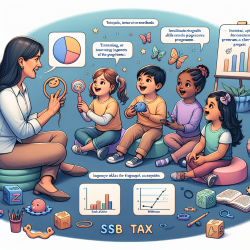Introduction
The study titled "Tax awareness and perceived cost of sugar-sweetened beverages in four countries between 2017 and 2019: findings from the international food policy study" provides valuable insights into how tax awareness and perceived costs can influence consumer behavior. While this research primarily focuses on sugar-sweetened beverages (SSBs), its implications can extend to other fields, including speech-language pathology. By understanding how awareness and perception influence behavior, practitioners can enhance therapy outcomes for children.
Understanding the Research
The study examined the perceived cost of SSBs, tax awareness, and changes in beverage purchasing across four countries: Mexico, UK, US, and Australia. It found that perceived costs and tax awareness were higher in countries with national SSB taxes (Mexico, UK) compared to those without (Australia) or with subnational taxes (US). The research highlights the importance of the 'signalling effect' of taxes, where consumer behavior changes not just due to price increases but also due to awareness of the tax.
Application to Speech Therapy
Speech-language pathologists can draw parallels between the research findings and their practice. Here are some ways to apply these insights:
- Enhancing Awareness: Just as tax awareness can influence consumer behavior, increasing awareness about speech therapy goals and progress can motivate children and parents. Regular updates and educational sessions can enhance engagement and adherence to therapy.
- Perceived Value: Similar to perceived costs of SSBs, the perceived value of speech therapy can impact participation. Highlighting success stories and providing clear, data-driven evidence of progress can reinforce the importance of therapy.
- Behavioral Change: The study shows that awareness can lead to behavioral change. Speech therapists can use this by setting clear, achievable goals and celebrating small victories to encourage continued effort and improvement.
Encouraging Further Research
Practitioners are encouraged to conduct further research on how awareness and perception influence therapy outcomes. By collecting data on parental and child awareness of therapy goals and measuring changes in engagement and progress, therapists can tailor their approaches to maximize effectiveness.
Conclusion
The insights from the SSB tax study can be a valuable tool for speech-language pathologists. By focusing on awareness and perceived value, therapists can enhance engagement and outcomes in therapy. For those interested in delving deeper into the original research, please follow this link: Tax awareness and perceived cost of sugar-sweetened beverages in four countries between 2017 and 2019: findings from the international food policy study.










